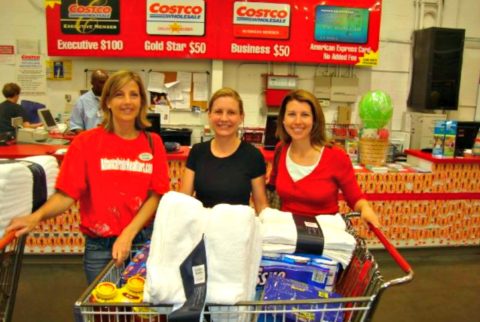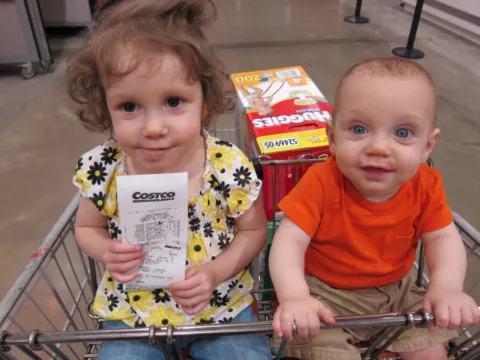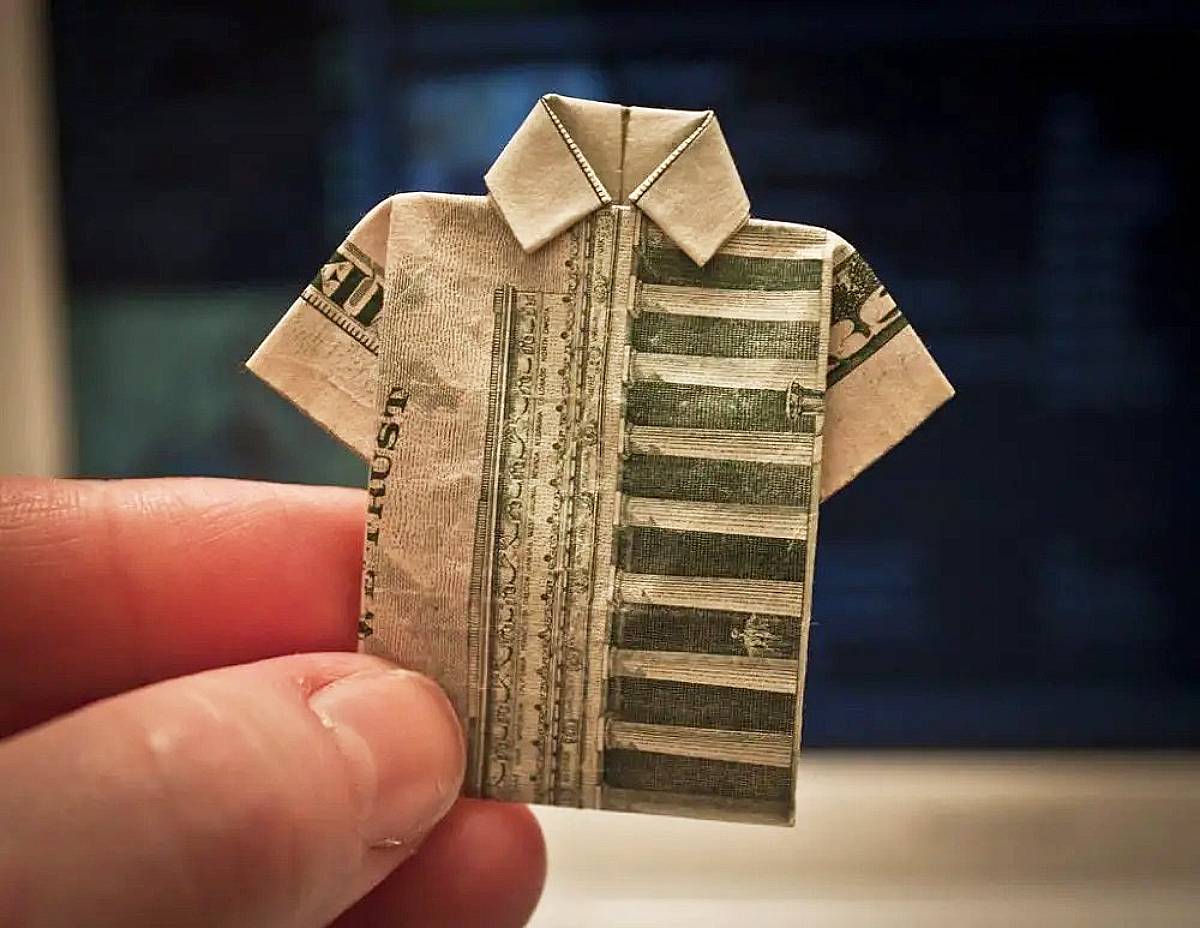When it comes to shopping, I love to save money. But as far as bulk shopping goes… I live in a tiny apartment, I don’t have tons of storage, and I live alone.
For the longest time, I wanted to save money by buying bulk items but was concerned about storage space and the sheer number of items included in most bulk purchases.
A friend of mine has a Costco membership and has offered to buy stuff there for me in the past — like dog food, cat litter, and bottled water. He’d use his membership and pay for the items, and I’d give him money for my portion of the items. That was a great money saver for me — since he already had the membership!
Then, we got excited one day when we ran in Costco together to “get a few things.” (You know how that goes, right?) I walked into Costco and got so excited about the deals — but quickly realized I didn’t need 6 bags of chicken tenderloins.
So, I had this brilliant idea — let’s split the items!
Following are my best tips to help you save money by buying bulk items with a friend, neighbor, or family member.
Tips For Bulk Shopping With A Friend
The best way to save money when you buy in bulk is to get together with a friend (or two) to effectively share a warehouse store membership.
First, split the annual cost of that membership (taking it down to $20 or so). And then split the larger bulk purchases in half.
These are some of my tips to save money bulk shopping with a friend:
- Shop alone or shop together at the warehouse stores.
- Compare your shopping lists before you go.
- Look for the items you have in common on your grocery lists.
- One of you goes to the store and buys those common items in bulk.
- Purchase those common items on one receipt.
- Go home, and split the items up, and have the other person pay half of the total on that receipt.
For example, If you typically buy toilet paper in a 4-pack at your local grocery store for $2, you can buy a 36-pack of that same exact toilet paper for $12. At the store, the cost per roll is 50 cents, but at the warehouse club, it’s 33 cents. (The only problem is the storage space.)
So, both of you should contribute $6 to the purchase of the jumbo pack and each of you takes home 18 rolls. When storage is an issue, 18 rolls are much easier to store than 36.
You could even start a bulk buying co-op! If you go this route, your best bet is to start small — with maybe just 3 members. Then, over time you might gradually build to 6 members (including yourself). With your own bulk shopping co-op, you’ll save lots of money by buying bulk items while helping out your friends and family members at the same time!
Now let’s talk about what you should buy in bulk and what you shouldn’t buy in bulk…
Items You Should Buy In Bulk
These items generally give you more bang for your buck when bought in bulk sizes:
- Toilet paper – Buying bulk toilet paper just means having a bunch of rolls at once.
- Soap and shampoo – Keep a large container of liquid soap and shampoo under the sink, and refill your smaller bottles as needed.
- Alcohol – Warehouse clubs have some impressive deals on beer, wine, and spirits.
- Office supplies – Buying office supplies in bulk can consistently result in some big savings.
- Toothpaste – Since toothpaste doesn’t go bad and isn’t a big item, storage isn’t an issue.
- Vitamins – Multivitamin prices at wholesale clubs are around 6.7 cents a pill. Stores like Walgreen’s have prices closer 9.3 cents per pill.
- Non-perishable food – A long shelf life makes items like dry beans and pasta great for bulk buying. You can save money buying bulk items like these and storing them in large containers.
- Detergent – It doesn’t go bad and is almost always cheaper per ounce at a wholesale club.
- Trash bags – Because of their compact nature, trash bags are super easy to store inside your home without taking up much space.
- Batteries – Lithium and alkaline batteries have a long shelf life (if kept in a cool, dry place).
Items You Shouldn’t Buy In Bulk
Unfortunately, when you’re trying to save money bulk shopping, the perceived savings are often canceled out by the amount that goes uneaten or unused and ends up being thrown away.
If you’re like me, you get excited when you see something that’s a better value when bought in bulk. But then you get bored stiff of it before it goes gone bad or loses its flavor.
Here are some items you should think twice about buying in bulk:
- Olive oil – Oils turn rancid after about 6 months or so. Depending on how often you cook, a large container of olive oil is likely to taste bad before you get to the bottom of the bottle.
- Brown rice or wild rice – Since they contain natural oils, they only last for 6 to 8 months past the printed expiration date.
- Instant oatmeal – The instant version with flavoring lasts just 6 to 9 months past the expiration date. On the other hand, instant and steel-cut oatmeal without flavoring lasts 1 to 2 years!
- Condiments – Ketchup, mustard, and mayonnaise are good to have on hand — but how often do you really go through a regular-sized bottle of these items? If you’re like most people, not too often. Unfortunately, condiments go bad soon after they’re opened — mayonnaise in just a couple months, while ketchup and mustard last closer to 6 months.
- Eggs – Unless you have a large family (or you just eat a lot of eggs), you’d pretty much have to make eggs a part of every meal just to get through a bulk carton of them — because they go bad 3 to 6 weeks after the stamped “best-by” date.
- Nuts – Pistachios only last 3 months past the expiration date. Walnuts last 6 months past the expiration date. Other nuts — such as macadamias, peanuts, and cashews — can last for 6 to 9 months. So unless you eat through nuts quickly, large containers of them are likely to go bad.
- Spices – Most of us have a cabinet full of spices, right? Unfortunately, most spices lose their potency after 6 months — a year at the most.
- Bleach – Liquid bleach starts to lose its effectiveness after 6 months, and the total shelf life of bleach is 12 months from the date of manufacture. So it pays to buy smaller jugs of bleach.
- Frozen items – Unfortunately, most everyone’s freezer space is limited. And items stored in a freezer don’t last forever – generally only about 8 to 10 months. Even if you can eat frozen items before their best by date, there’s freezer burn to consider.
Any Disadvantages To Bulk Buying?
Yes. Not everything at warehouse clubs is sold in bulk (either in larger container sizes or more containers).
For example, you can only buy milk by the gallon. And if you’re looking for a new inkjet printer, you’ll get what the warehouse club thinks is a good price on ONE of them.
In those instances, the savings may not amount to much — so be sure to compare prices by shopping around first.
Truthfully, for single items, you’ll probably be better served by shopping for some items at your favorite grocery or electronics store.
Here are some other reasons you might not want to buy bulk items:
- Some items cost more per unit of measurement when bought in the bigger container.
- The variety is somewhat limited.
- Some items like fruit or baked goods perish quickly. You’re not saving money if the product goes to waste.
- You might save money by buying items in bulk that you use less often, like cat shampoo, but you’d be tying up money that might be better used elsewhere.
- You have to account for storage of these items.
See How Much You Can Save By Bulk Shopping
I really was curious about how much savings I could expect, so I did my own bulk shopping experiment.
Here’s my shopping list:
- 4 batteries
- 2 sticks of deodorant
- 8 rolls of paper towels
- 100 oz of laundry detergent
- 12 rolls of toilet paper
At Costco, the total for these items was $31.88.
Amazon’s Subscribe & Save came in at $32.88.
Obviously, the difference is only a dollar — but if you’re not comfortable buying groceries online, or you just like the act of physically shopping when you buy bulk items, then Costco makes more sense.
The difference between a grocery store, a pharmacy, and a convenience store is much more evident for the items listed above:
- At ShopRite: $43.83
- At CVS: $55.91
- At 7-Eleven: $71.27
After crunching the numbers, I found that a great majority of the items were indeed cheaper at Sam’s. On average, the savings amounted to 31%, more than enough to easily offset the $35-45 annual membership fee … The big winners: cereal/bread, cooking/baking, snacks, and other averaged nearly 40% savings. Still not impressed? Buy some raisins, syrup, bottled water, and sandwich bags and you can save an average of 66%. And it doesn’t stop there. You can rack up even more savings by buying generics in bulk, where I found savings of up to 83% on items like aspirin and hand sanitizer. Source
How To Store Your Bulk Purchases
If you decide to buy bulk food, make sure that you have ways to properly store and preserve the items. Otherwise, it won’t help you save money by buying bulk items if you end up throwing much of it away.
You’ll definitely need airtight storage containers and a cool dry place (away from direct sunlight) to store your bulk food items in.
Here are some tips for storing food that you buy in bulk:
- For most food items, glass or plastic containers work great. For example, 5-gallon plastic buckets with lids and Mason jars with tight lids are good storage options, depending on the size you need.
- To preserve fruits and vegetables, blanch and then freeze them. You could also consider having a canning party with friends. Most fruits and vegetables can be frozen for 18 months or so, if properly packaged.
- Freezing grains can help preserve them. In fact, some experts recommend freezing grains for several days before storing them in a dark, dry, 60-degree (or colder) location. Did you know that you can even freeze cooked grains?
- Dehydrating produce is another good option. Instead of canning or freezing, drying produce removes the water, so it will last much longer. You can dehydrate almost anything – from fruits & vegetables to meats (jerky), herbs, and rubs.
If you have large quantities of root vegetables to store, consider building an outdoor root cellar.
More Ideas To Help You Save Money Bulk Shopping
In addition to the tips and links I’ve included above, here are some other great resources to help you save money when you buy in bulk:
- The Dark Side Of Buying In Bulk
- How To Set A Bulk Shopping Budget
- 8 Best Websites To Buy Bulk Items Online
- The Ultimate Guide To Buying In Bulk
- How To Buy Food In Bulk At A Grocery Store
- Buy More, Spend Less: How Buying In Bulk Saves Money
- Top Sites For Buying Groceries & Perishables Online
I’m a health nut, a frugal mom, a dog lover, a DIYer, and a gadget girl. Personally, as a post-divorce, working single mom on a budget I have a lot of experiences that I enjoy sharing so others can learn from the things I wish I knew earlier! Professionally, I’ve worked full-time in a variety of marketing, sales, and editing jobs. You can always find me at the corner of Good News & Fun Times as Managing Editor at The Fun Times Guide (32 fun & helpful websites).






